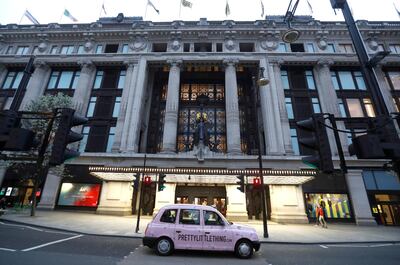More than a year into the pandemic that’s dramatically changed consumer habits, one of the most prized retail assets in the UK is potentially coming up for sale, testing the appetite for physical outlets in an era of online shopping.
Selfridges, the luxury emporium best known for its giant department store on London’s Oxford Street, may be on the block with a £4 billion ($5.64bn) price tag following an unsolicited approach, according to people familiar with the discussion. The current owner, the Canadian Weston family, has hired Credit Suisse to advise on the overture from an unidentified buyer, said the people, who asked not to be named because the deliberations aren’t yet public.
The department store is among the most famous in the world, eclipsed in London only by Harrods. While other brands have struggled or closed down entirely, Selfridges was able to withstand the downturn in recent years with its blend of cutting-edge fashion and a broad range – the shoe department is among the largest in the world and the rooftop terrace is a popular gourmet destination. A considerable part of the asset’s value lies in the real estate, which spans a large section of Oxford Street, London’s most popular shopping mile.
But the Weston clan also prides itself in its long-term approach to investments. Since gaining control of Selfridges 18 years ago, the family has invested heavily in the store. The store has outlets in Manchester and Birmingham, where Selfridges occupies a windowless space-age building vaguely reminiscent of a giant silver slug. Besides, the timing of a sale may not be ideal, said Peter Williams, the former chief executive of Selfridges who ran the business before the sale to the Westons.
“Oxford Street and Central London will be the last to recover from Covid because of the lack of tourists so why would you sell it now?” Mr Williams said. “If I was in their shoes I would bat away any approach quickly as it can be a distraction and doesn’t help the running of the business. Particularly right now when everyone is working so hard to bring physical retail back to life.”
Spokesmen for Selfridges and Credit Suisse both declined to comment on the potential sale.
Founded in 1908 by Harry Gordon Selfridge, the retailer came under control of Canadian businessman Galen Weston in 2003 for almost £600 million. The group has since expanded to other department store chains, including Arnotts and Brown Thomas in Ireland, Holt Renfrew in Canada and de Bijenkorf in the Netherlands. The holdings outside the UK and Ireland wouldn’t be included in the proposed sale, the people said.
Assessing the value of the real estate will be a key part of any possible sale. A chance to own the 540,000 square foot (50,168 square meters) Beaux Arts store on Oxford Street is an attractive proposition. But it’s also become a location increasingly surrounded by vacant neighbors. Rival department stores on the UK’s busiest shopping street including Debenhams and House of Fraser have closed, while John Lewis is pursuing plans to convert part of its store into offices.
About 9.4 per cent of retail space in London’s West End is now vacant, causing rents for the best central London stores to plunge by about 14 per cent in the year through March, according to research published by UK property agent Savills. Oxford Street rents are down almost 18 per cent in the period, the broker’s data show. That’s hit investor demand for stores in London’s tourist heartlands, with deals in the first quarter down by almost 46 per cent.
While Selfridges has performed well operationally for many years and delivered tens of millions of pounds in dividends to the Westons, it is not immune to the challenges in retail. The latest accounts filed filed for the parent company reveal how Covid-19 has significantly impacted profit in the short-term, which could put pressure on their banking covenants and require additional support from the family.

“Anyone buying it will likely be after the brand as Selfridges only has a few stores really,” said Tony Shiret, a retail analyst at Panmure Gordon. “They would probably want to try and monetize the name by perhaps opening a few flagships around the world and driving the digital business.”
The Westons have also been active owners. Most recently they investing £300m to upgrade many parts of the Oxford Street store. As a family, they have been a dominant force in retailing for four generations, with extensive interests that are split into two branches in Canada and the UK.
The Canadian wing controls Selfridges, while the UK side controls Associated British Foods, the owner of Primark and Fortnum & Mason, the grocer to the Queen.
W.G. Galen Weston, the grandson of dynasty founder George Weston and family patriarch, died earlier this year. His children Galen and Alannah, who is chair of Selfridges Group, remain in the business. George Weston, a cousin, runs Associated British Foods.
Although the pandemic has hit Selfridges hard, there will still be significant interest from buyers, according to Jonathan De Mello, a partner at CWM consultancy. Already, speculation is mounting that sovereign wealth funds, trade buyers and private equity will be exploring bids, he said.
“A once-in-a-generation deal, perhaps providing a major Chinese player the perfect opportunity to capture a huge luxury footprint in one go,” said Anthony Selwyn, the head of London and International retail at Savills.

